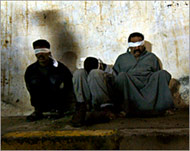The semantics of Iraqi sovereignty
Commenting on the legitimacy of the new Iraqi government, Human Rights Watch’s Kenneth Roth recently said: “Being sovereign is like being pregnant: you either are or you aren’t.”

But international law experts seem divided on whether Iraq is pregnant, a little bit pregnant or not pregnant at all.
The Red Cross must decide whether Iraq is an occupied land or not before informing the country’s main actors about their obligations under international humanitarian law.
But the Geneva-based organisation has yet to do so.
And a cursory look at the world’s media reveals it is far from unanimous about how to refer to the Iraqi reality post-28 June.
Some analysts characterise Iraq as being in a “post-occupation” phase, while others say the US-led occupation force remains sovereign in the country.
Supporters of the first theory point to a United Nations resolution that recognised the transfer of authority from the US-controlled Coalition Provisional Authority to the Iraqi government.
However, critics argue Iraq cannot be sovereign while 160,000 foreign troops are on its soil, and its government has been appointed by foreigners.
‘Little freedom’
Joost Hiltermann, a Jordanian-based Iraq expert at the International Crisis Group (ICG), says the reality on the ground is that Iraq is still occupied.
“One could argue the UN resolution on 8 June which recognised the Iraqi government and authorised a foreign force gives them legitimacy,” he told Aljazeera.net.
|
“Iraq is still an occupied country because of the presence of foreign military forces that Joost Hiltermann, |
“But in reality, Iraq is still an occupied country because of the presence of foreign military forces that have almost total independence of action.
“The new interim government also has very little freedom to act by itself. It is a government without security forces of its own and completely reliant on foreign forces for protection.”
Hiltermann says Iraq’s financial dependence on the Americans further hinders its pretensions to sovereignty.
“It is true that Iraqi oil revenue is getting back on stream but Iraq still has a lot of debts to pay and the revenues are nowhere near sufficient to cover its costs.
“So Iraqis are still very much dependent on the largesse of the international community.”
Human rights groups say Iraq’s legal status is crucial because an occupier has certain obligations – such as the duty to provide security and basic services to an occupied population.
Clarity needed
Amnesty International said last month that clarity was urgently needed on the fate of thousands of prisoners currently held in Iraq as well as the role, responsibility and accountability of the occupation force.
 |
|
The legal status of US-held Iraqi |
Any further detentions by the US and other members of the “multinational force” after the handover would be unlawful, Amnesty said.
Nevertheless, the US promptly announced it would continue to hold, without charge, between 4000 and 5000 detainees without clarifying on what legal basis it would do so.
Rights groups have also raised concerns over the CPA’s granting of immunity to British and US troops just before the 28 June handover.
On the other hand, those who say Iraq is not occupied point to a Security Council resolution passed on 8 June.
The UN resolution unanimously endorsed the new Iraqi government, which it said would pave the way for Iraqis to assume “full responsibility and authority” for their country, including decisions on security matters.
Security Council President Lauro Baja later welcomed “the handover of full responsibility and authority for governing Iraq to the fully sovereign and independent Interim Government of Iraq thus ending the occupation of the country”.
Mere diplomacy
According to ICG’s Hiltermann, the UN resolution revealed more about international diplomacy than about the reality on the ground in Iraq.
He told Aljazeera.net: “I think the UN Security Council resolution in June was more about the need for governments to paper over the raw wound caused by Iraq. I think the situation in Iraq itself was a sideshow: the resolution was about mending transatlantic differences.
“One could even make the argument that by recognising the interim government and authorising multinational forces in Iraq, the UN is legitimising the occupation,” Hilterman said.
|
“Issues of sovereignty and whether it is American Enterprise Institute |
But Michael Rubin, a Middle East expert at the Washington-based American Enterprise Institute, a conservative thinktank, says the situation in Iraq post 28 June is “imperfect, but heading in the right direction”.
“I think it would be preferable to have a formal agreement about the foreign forces between the interim government and the multinational force,” he said.
But Rubin adds the new interim government should be given a chance to prove its mettle and smooth the way for democratic elections next year.
“I do have qualms about the interim agreement and the powers it gave to the Iraqi government, and I think the US may well try to exert pressure through financial aid,” he said.
“But issues of sovereignty and whether it is an occupation notwithstanding, we shouldn’t cut the legs from under the new government.”